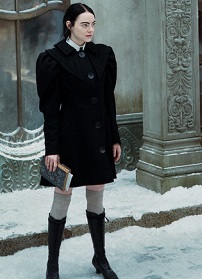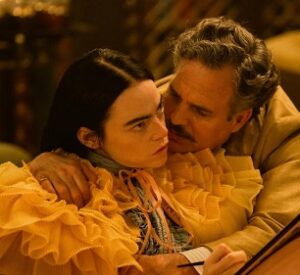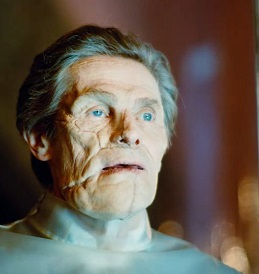Poor Things
 In Yorgos Lanthimos’ latest film “Poor Things,” Willem Dafoe plays Dr. Godwin Baxter, a mad scientist Dr. Frankenstein-type anatomy professor in turn-of-the-century London, who reanimates a recently deceased young woman by inserting the brain of her unborn baby. Horrendously disfigured by God only knows what experiment-gone-wrong, Baxter won’t venture outside his home (save for his university classes), therefore confining his project, Bella, to a life of pent-up solitude.
In Yorgos Lanthimos’ latest film “Poor Things,” Willem Dafoe plays Dr. Godwin Baxter, a mad scientist Dr. Frankenstein-type anatomy professor in turn-of-the-century London, who reanimates a recently deceased young woman by inserting the brain of her unborn baby. Horrendously disfigured by God only knows what experiment-gone-wrong, Baxter won’t venture outside his home (save for his university classes), therefore confining his project, Bella, to a life of pent-up solitude.
Scientific project
But you see, Bella (played to the hilt by Emma Stone) develops quickly. Initially, she hobbles about like a toddler, and speaks in non-quite full-sentence baby talk. But soon she desires more. Bella wants to experience the big world of the outdoors. What’s out there? What more can she learn by joining these other people she sees from inside Baxter’s eerie Victorian mansion?
Baxter employs Max McCandles (Ramy Youssef), one of his top medical students, to track Bella’s every move when the good doctor is away. Max and Bella soon develop feelings for one another, and before long the two are to be wed. It’s a perfect match, as Max is fully aware of Bella’s past, and the reason and method for her existence. He’s the ideal mate to guide her through the intricacies of society. As Bella’s intelligence develops, her social skills do not. She must be taught not to spit out her food if she doesn’t like it. Bella wonders aloud why she should keep food in her mouth that disgusts her – not understanding the social mores of expelling it back onto her plate. It is this adaptation to society routine that gives “Poor Things” the spark which has been sorely lacking from any other Lanthimos film.
 Wry sense of humor
Wry sense of humor
Adapted from Alasdair Gray’s 1992 novel by screenwriter Tony McNamara, “Poor Things” succeeds where “The Killing of a Sacred Deer” and even the acclaimed “The Favourite” failed, because it is injected with a wry sense of humor that borders on a cross between Wes Anderson and Monty Python. The self-righteous affectation of the upper class (particularly that of Victorian England) is always ripe for skewering, and Lanthimos takes no prisoners here, but wisely never crosses the line into buffoonery the way Python was wont to do.
Never crosses the line
Oh sure, there are plenty of Lanthimos’ trademarks here – the uncomfortable sewing and cutting of human flesh, both dead and alive, as well as the insertion of modern-day speech vulgarity into times past – but he always keeps the humor astute and insightful. Never does he allow Bella to make such a scene in public as to embarrass herself and all those around her. Any number of Saturday Night Live alums would have crossed this thin line. Lanthimos deserves kudos for staying true to his characters.
Ruffalo
“Poor Things” takes a novel turn almost immediately upon Bella’s decision to marry Max. She meets high-class scoundrel Duncan Wedderburn, played by the practically unrecognizable Mark Ruffalo, who sinks his teeth into one of the film’s meatiest roles. Without any knowledge of Bella’s past, Duncan embarks on a European vacation with the newly betrothed Bella. Bella doesn’t realize marriage is a sacred vow. Nor does she understand all this “furious jumping” (nee sex) is to be confined to just one man. This makes for some hilarious scenes, although Lanthimos’ obsession with sex causes this stage of Bella’s development to occupy too much screen time.
 Dafoe
Dafoe
In his meatiest role since “The Florida Project,” Dafoe is wickedly distasteful as the mad scientist – a role he could play in his sleep, but which he revels in here, in large part because Dr. Baxter has a heart. Yes, he’s spent his career cross breeding various farm animals – to humorous yet macabre effect, – but he also takes a certain ownership of Bella. His concern for her well-being is that of a father figure. In her babyish state, she calls him “God” because she is unable to say “Godwin.” This nomenclature is not necessarily a metaphor, as we will learn.
Stone
And Stone – whose best performance heretofore was her Oscar-winning turn as the sensitive and encouraging young actress in “La La Land,” – is even better here, in a role she develops as it plays out. Her baby-walk moves and speech patterns are annoying during the early scenes, but as the Bella character grows, Stone takes the part and runs with it. Following the European tour, the “adult” Bella speaks using upper-class English, peppered with a liberal dose of scientific jargon – undoubtedly derived from her time with Dr. Baxter, — yet she still lacks understanding of some of the most obvious social mores. Obvious to the rest of us, that is. And therein lies the humor of “Poor Things.” We take for granted certain etiquette codes which Bella would have no way of knowing. Her depth of knowledge is limited only to that which she has been taught.
Cinematography
Lanthimos and cinematographer Robbie Ryan shoot the entire picture with an extreme wide-angle lens, which serves to accentuate the action while also highlighting the exquisite sets. As with Wes Anderson or Stanley Kubrick, every shot is a photograph; and everything in that shot belongs there for a reason. Lanthimos and Ryan also shoot the first portion of “Poor Things” in black and white, which works perfectly given the 1900-ish setting coupled with the Frankenstein theme. But then the filmmakers abruptly shift to color upon Bella’s first sexual encounter. (Again, the over-emphasis on sex is prevalent throughout.) I believe the dry, dark humor of the later scenes would have shone more vividly had they stuck with black and white.
Problems with the film
At 141 minutes, “Poor Things” is simply too long. And the final sequence where Bella’s husband from her previous life reappears is superfluous and unsatisfying. Furthermore, I can’t say I completely understand what it is I’m supposed to take from this film. What’s the angle here? What’s the underlying theme?
Funny and unique
“Poor Things” is not the year’s best film; it’s not the utter crowd-pleaser of “The Holdovers” or the forthcoming “American Fiction.” But it is by far Lanthimos’ best offering to date. If this is not Stone’s best performance, it’s certainly in her top two or three. It is another tour-de-force for Willem Dafoe. It’s an oddly satisfying foray for Mark Ruffalo. It’s not for everyone’s taste. But it is wickedly funny in parts, eerie and moody, and completely and totally unique. You’ve never seen anything quite like “Poor Things,” and are not likely to again.
Andy Ray‘s reviews also appear on https://townepost.com/.